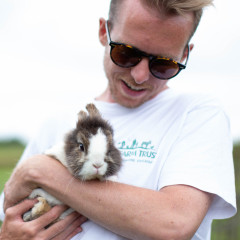Why we should add compassion to our mindfulness practice
Feb 14, 2022 — Steven Yorke
As humans, we have an innate propensity for compassion. We have evolved to become highly social animals, meaning that we naturally want to support our friends and family and to alleviate the suffering of others. This might explain why compassion consistently shows up in cultural and religious teachings around the world. The ‘Golden Rule’ of treating others as you would like to be treated is found in religions such as Christianity, Judaism, Islam, Hinduism, Taoism, Buddhism and Hinduism, as well as secular traditions such as Humanism.
Research has shown that acting compassionately can make us happier, as the same parts of the brain are activated when we help others as when our personal desires are gratified. Further research has shown that compassion improves not only our mental health but our physical health, speeding up recovery from disease.
Dacher Keltner, a psychology professor at UC Berkley, has found that that when people perform
behaviors associated with compassion, such as warm smiles and friendly hand gestures, their bodies produce more oxytocin. Keltner says that ‘this suggests compassion could be self-perpetuating: Being compassionate causes a chemical reaction in the body that motivates us to be even more compassionate’.
However, there are some things that get in the way of our innate loving nature, such as fear, ego, and the illusion that we are separate or different from others. When these things lead to us living uncompassionately, it not only negatively impacts the people around us, but it also hurts our own mental and physical wellbeing. And in today’s polarized world, it seems to be more important than ever for us to foster compassion. So how can we go about doing that?
Fostering compassion
Self-compassion
Loving Kindness meditation, or Metta meditation, involves directing warmth and positivity to ourselves and to others. This might feel unusual or uncomfortable at first, but it can have a truly perspective changing effect on our lives. This type of meditation cultivates a more compassionate and empathetic mindset, which has been shown to increase happiness, reduce stress and improve overall wellbeing.
Expressing kindness towards ourselves will open the gates to a more accepting and selfless way of being. It is the first step in developing compassion, as we must first learn to show compassion towards ourselves before we’re able to genuinely show compassion to others.
You can start a 10-day compassion and loving-kindness meditation course today by downloading the 100% free Medito app.
Compassion for others
Once we have developed self-compassion, we can move on to practicing compassion for others. We can start by sending positive thoughts towards friends or family. Then move on to thinking of well wishes for people that we don’t have strong feelings for, or even for people that we dislike. This way, we can learn to develop genuine compassion for the world around us - an unconditional selflessness that permeates our lives.
By extending our compassion to all living things, we can feel a deeper connection with the environment, with nature and with the ecosystems in which we live and of which are a part. Extending compassion to non-human beings is a chance to expand on our loving nature and to find happiness. We can achieve a sense of purpose in the world, in caring for and protecting those creatures who are less able to protect themselves.
Non-violence to all living things ties in with the ancient Indian principle of Ahimsa, found in the religions of Jainism, Hinduism, and Buddhism. It is the ethical principle of not causing harm to other living things. The concept is also found in the Charter for Compassion, which calls on us to ‘work tirelessly to alleviate the suffering of our fellow creatures’.
Empathy
Our brains are wired to feel empathy for others. Have you ever felt sad when you see another person crying? This is because we have mirror neurons in our brains that react when we see an action of another. This means that we’re provided with a direct personal experience of somebody else’s emotions. And humans aren’t the only animals that have mirror neurons. So far, they have also been found in macaques and songbirds!
As we practice loving-kindness meditation and develop a more compassionate frame of mind, we are likely to develop our natural empathy. We can choose to foster this by focusing on empathy as part of meditation, creating a positive feedback loop. The more compassionate we become, the more empathetic we become, and the more empathetic we become, the more we're able to live compassionately.
Selflessness
Selfishness is based on illusion. To some, it might seem logical to think that the way to make ourselves happy is to put ourselves before others and to focus on our own needs and wants. However, when we chase our own selfish desires, we are never satisfied. When we get what we want, our desires inevitably shift to the next thing and the chase continues, along with that feeling of dissatisfaction.
A way to escape this cycle is to focus instead on selflessly helping others. We can find a sense of purpose in our lives and experience real joy when we help others.
Forgiveness
When somebody hurts us, forgiveness can feel difficult, or sometimes even impossible. But when we hold onto anger or resentment, it only hurts us. That's why it's good to meditate on forgiveness. We can let go of our negative feelings and return to a place of peace and contentment. As Lewis B. Smedes said, "To forgive is to set a prisoner free and discover that the prisoner was you."
Acts of kindness
As we go about our daily lives, there are many opportunities to enact kindness. We can start to make a habit of doing good deeds, by aiming to do at least one a day. Soon, it will become second-nature and not even something that we have to think about. We don't necessarily have to carry out grand gestures, and sometimes we shouldn't, especially if they are fuelling our own ego. A simple kind word to somebody, or a small act of generosity can go a long way.
Gratitude for love
Gratitude and loving-kindness are both powerful practices that can help us find peace and happiness. Even if we feel like we currently lack love in our lives, we know that we have the capacity for love within us, and we can foster feelings of self-love.
Love as the natural state of being
When we are completely at peace, it's possible to realize that love comes completely naturally to us. However, things often get in our way, such as fear, anger, frustration, jealousy or anxiety. We don't need to try to push these feelings away, but when we pay close attention to them while having the understanding that they are not permanent, the feelings can pass. When they do, we can return to a state of peaceful loving-kindness. This is how mindfulness and compassion are so closely related.
The Medito app includes hundreds of free meditation sessions, including a course on compassion and loving kindness.
